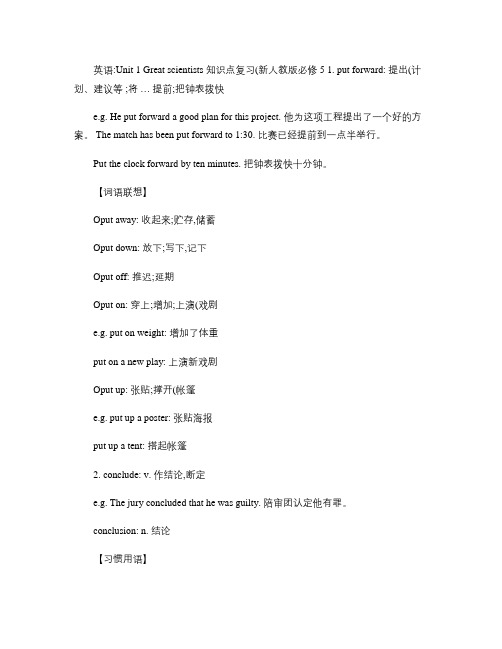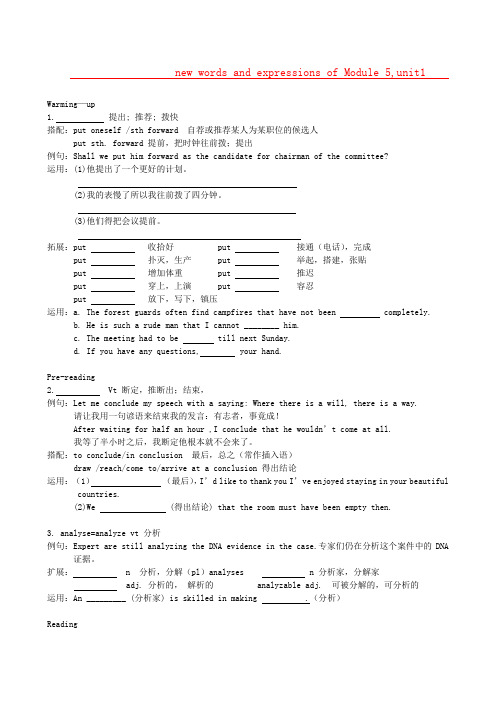必修五unit1Greatscientists词汇考点
- 格式:doc
- 大小:29.00 KB
- 文档页数:5

人教版高中英语必修5Unit 1 Great scientists单元复习知识点归纳:1.★考点put forward提出put forward提出;拨快;推荐;提前put aside把……放到一边;储存;不理睬put off推迟,延期put on穿;上演put up举起;建起;提高put away收起来放好put down写下put out生产;扑灭put up with忍受,容忍The manager put forward a suggestion that we should have an assistant.There is too much work to do.经理提出了一条建议,我们应该有个助手。
要做的工作太多了。
2.★考点conclusion n.结论draw a conclusion得出结论in conclusion总之come to the conclusion得出结论conclude v.推断;断定;决定;结束conclude from从……推断出to conclude总之In the end the idea almost always leads them to the same conclusion.最终这个想法几乎总是使他们得出同样的结论。
3.★考点expose vt.暴露;揭露;使曝光exposure n.暴露;揭发be exposed to使暴露在……exposed adj.暴露的expose sb./sth.to...使某人/某物暴露在……expose sth.揭露某事4.★考点blame vt.责备;谴责;把……归咎于n.过失;责备be to blame应该受到责备blame sth.on sb.把某事怪到某人头上put/lay the blame on sb.把过失归咎于某人take/bear the blame承担责任5.contribute vt.& vi.捐献;贡献;捐助(P4)contribute...to...对……做出贡献;给……撰稿;有助于;导致contribute to捐献,促成,有助于contribution n.贡献make a contribution to/towards对……做贡献例如:I’ve been asked to contribute an article to the language magazine.6.★考点make sense讲得通;有意义make sense of理解,明白a sense of smell/touch/hearing/taste/sight 嗅觉/触觉/听觉/味觉/视觉in a sense在某种意义上common sense常识7.★考点reject vt. 拒绝;不接受;抛弃I don’t want to reject any help.我不想拒绝任何帮助。

英语:Unit 1 Great scientists 知识点复习(新人教版必修 5 1. put forward: 提出(计划、建议等 ;将… 提前;把钟表拨快e.g. He put forward a good plan for this project. 他为这项工程提出了一个好的方案。
The match has been put forward to 1:30. 比赛已经提前到一点半举行。
Put the clock forward by ten minutes. 把钟表拨快十分钟。
【词语联想】Øput away: 收起来;贮存,储蓄Øput down: 放下;写下,记下Øput off: 推迟;延期Øput on: 穿上;增加;上演(戏剧e.g. put on weight: 增加了体重put on a new play: 上演新戏剧Øput up: 张贴;撑开(帐篷e.g. put up a poster: 张贴海报put up a tent: 搭起帐篷2. conclude: v. 作结论,断定e.g. The jury concluded that he was guilty. 陪审团认定他有罪。
conclusion: n. 结论【习惯用语】★ draw a conclusion 作出结论3. defeat vt. 打败 , 击败 , 战胜; 使 (希望 , 计划等失败 , 挫败 ; 阻挠 , 使无效 e.g. He finally conceded defeat . 他最终承认了失败。
◆区别 : defeat, conquer, overcomeØdefeat 指“ 赢得胜利” , 尤其指“ 军事上的胜利” ,e.g. defeat the enemy 打败敌人。
Øconquer 指“ 征服” 、” 战胜” , 特别指“ 获得对人、物或感情的控制” , 如 : e.g. conquer nature 征服自然。

人教版英语必修五 Unit 1 Great scientists重难点【重点】(1)了解著名医生John Snow、钱学森、哥白尼等科学家以及他们的作为和故事。
(2)学习表示意愿、希望和建议的句型。
(3)学习过去分词作定语和表语的结构。
(4)学习写好“persuasive writing”,以训练学生的逻辑思维及写作能力.一、重点单词1、characteristic n. 特征,特性2、expose vt. 暴露,揭发,曝光(摄影)3、defeat vt. & n. 击败;战胜;4、cure vt. & n. 治愈,治疗法5、blame vt. 责备,归咎6、backward adj. & adv. 向后7、conclude vt. & vi. 结束,总结二、重要词组句型1、in addition 此外2、apart from除……以外(except for);除……外,还有(besides)3、be strict with sb. 对某人严格4、lead to 导致,通向(to 为介词)5、link…to… 将……和……连接起来6、keep sb /sth +doing /done /adj. 让某人或事物做……三、课文长句难句1、In addition, he found two other deaths in another part of London that were linked to the Broad Street outbreak.2、To prevent this from happening again, John Snow suggested that the source of all water supplies be examined and new methods of dealing with polluted water be found. 2四、语法知识——过去分词的用法【词汇积累】1. put forward 提出2. draw a conclusion 得出结论3. be/get under control 在……控制下be/get out of control 失去控制,不能操纵4. be absorbed in 专心5. be to blame 应该受责备(用主动形式表示被动)blame sb. for sth. 因某事责备某人6. in addition 也,另外,此外7. link...to... 将…和…连接或联系起来8. die of 因…而死亡(内因)die from 因…而死亡(外因)9. lead to 导致,通向10. make sense 有意义,说得通11. apart from 除…之外,此外12. contribute to 为…作贡献或捐款,导致,有助于13. be enthusiastic about 对…热情14. be curious about 对…好奇15. cure sb. of illness 治好某人…病16. point of view 态度,观点,看法17.(be)strict with sb. 对某人要求严格【重点单词用法精解】1. characteristic n. 特征,特性The chief characteristic of human being is that they can think. 人类主要的特征是他们会思考。

必修 5 Unit 1 Great scientists核心单词1. characteristicn.特色;特性;典型adj.特有的,表示特性的;典型的Kindness is one of his characteristics.和善是他的特性之一。
A characteristic of the camel is its ability to live for a long time without water.骆驼的一个特点是不喝水也能活很长时间。
He proved himself a true gentleman and the beauty of his was seen at its best when he worked with others. (2010·01·山东德州检测)A. CharacteristicB. characterC. AppearanceD. temper解析:选B。
句意为:他证明自己是个真正的绅士,和别人一起工作的时候,他的性格总表现出最好的一面。
character作名词时,表示“性格;特点”,一般是不可数名词;characteristic是可数名词,常用复数形式,表示“总的特点”。
易混辨析character/characteristiccharacter n.性格,品质(本身具有的);角色,人物;字体,字符characteristic n.特点,特征(用以区别于其他事物的)高手过招单项填空2. defeatvt.击败;打败;使(计划、希望)落空Our team defeated our opponent by 5:0.我们队以五比零的比分战胜了对手。
He was defeated in his plan.他的计划失败了。
易混辨析defeat/conquer/overcome三个词都含有“战胜”、“击败”的意思。
defeat指“赢得胜利”,尤其指军事上的胜利,如:defeat the enemy(打败敌人)。

重点单词(必修 5 Unit 1 Great scientists)(讲义)高中英语重点单词(必修 5 Unit 1 Great scientists)1. 学习单词,注意重点单词的用法并灵活运用这些单词。
2. 牢记核心单词的介词搭配及其重要用法。
重点:conclude, attend, expose, absorb, blame难点:absorb的用法。
【单词学习】1. conclude vt.& vi. 断定,推断;使结束,终止;达成,缔结conclude sth. with sth. / by doing sth. 以……结束conclude sth.(from sth.) that... (从……)推断出,断定He concluded from their remarks that they were not in favour of the plan.他从他们的话语中推断出他们不赞同此项计划。
He concluded by wishing everyone a safe trip home.他讲话结束时祝愿大家回家一路平安。
conclusion n. 结论;结束draw / reach / arrive at / come to a conclusion 得出结论come to the conclusion that... 所得结论是……in conclusion 最后attend on / upon sb. 伺候某人;照顾某人attend to sb. / sth. 照顾某人/专心于处理某事He is very famous in this field, and tens of thousands of fans will attend his lecture this evening.他在这个领域很出名,今晚会有成千上万的粉丝听他的讲座。
He has to attend (on) his sick son.他不得不照顾生病的儿子。

new words and expressions of Module 5,unit1Warming—up1. 提出; 推荐; 拨快搭配:put oneself /sth forward 自荐或推荐某人为某职位的候选人put sth. forward 提前,把时钟往前拨;提出例句:Shall we put him forward as the candidate for chairman of the committee?运用:(1)他提出了一个更好的计划。
(2)我的表慢了所以我往前拨了四分钟。
(3)他们得把会议提前。
拓展:put 收拾好 put 接通(电话),完成put 扑灭,生产 put 举起,搭建,张贴put 增加体重 put 推迟put 穿上,上演 put 容忍put 放下,写下,镇压运用:a. The forest guards often find campfires that have not been completely.b. He is such a rude man that I cannot ________ him.c. The meeting had to be till next Sunday.d. If you have any questions, your hand.Pre-reading2. Vt 断定,推断出;结束,例句:Let me conclude my speech with a saying: Where there is a will, there is a way.请让我用一句谚语来结束我的发言:有志者,事竟成!After waiting for half an hour ,I conclude that he wouldn’t come at all.我等了半小时之后,我断定他根本就不会来了。
搭配:to conclude/in conclusion 最后,总之(常作插入语)draw /reach/come to/arrive at a conclusion 得出结论运用:(1)(最后),I’d like to thank you I’ve enjoyed staying in your beautiful countries.(2)We (得出结论) that the room must have been empty then.3. analyse=analyze vt 分析例句:Expert are still analyzing the DNA evidence in the case.专家们仍在分析这个案件中的DNA 证据。
高中必修五英语Greatscientists重点知识高考非常强调语篇意识,即使是单项选择题,读不懂题干也不可能作对题目。
下面是小偏整理的高中必修五英语Greatscientists重点知识,感谢您的每一次阅读。
高中必修五英语Greatscientists重点知识【重点词汇、短语】1.putforward提出2.conclude结束,结论3.drawaconclusion得出结论4.defeat打败5.attend照顾,护理,出席6.exposeto使显露7.cure治愈,治疗8.challenge挑战9.suspect怀疑,被怀疑者10.blame责备11.handle柄,把手,处理,掌控12.link联系,连接13.linkto将…和…连接14.announce宣布15.contribute捐献,贡献16.apartfrom除了17.bestrictwith对…严格18.makesense讲的通,有意义19.spin使旋转20.reject拒绝,抛弃【重点句型】1.Whatdoyouknowaboutinfectiousdiseases?你对传染性疾病了解多少?2.JohnSnowwasafamousdoctorinLondon–soexpert,indeed,thatheattendedQueenVictoriaasherpersonalphy sician.约翰•斯诺是伦敦一位著名的医生——他的确医术精湛,因而成为维多利亚女王的私人大夫。
3.Buthebecameinspiredwhenhethoughtabouthelpingordinar ypeopleexposedtocholera.但当他一想到要帮助患了霍乱的普通老百姓,他就感到很振奋。
4.Neitheritscause,noritscurewasunderstood.人们既不知道它的病源,也不了解它的治疗方法。
5.Heknewthatcholerawouldneverbecontrolleduntilitscausew asfound.他知道,在找到病源之前,霍乱疫情是无法控制的。
必修五unit1 Great scientists词汇考点1 . Conclude ____________conclude sth (from sth)_____________conclude…with/by doing…________________________conclusion n. _____________come to/draw/reach a conclusion _________________________in conclusion _________________【活学活用】(1) 会议于十点钟在《国际歌》中结束。
The meeting ____________________________at ten o'clock.(2) 他们从这些事实中得出了不同的结论。
They ________________________________the facts.(3) 你从这些观察中能得出什么结论?________________________from these observations?2.attend vt.(take care of, look after)照顾;( to be present at)出席;(to accompany or wait upon as a servant)护理;(go to…)上(学等)attend a lecture/movie/meeting ____________________________attend on/upon sb _________attend to _________attend school/classes _______attend church ______________attendant n. _______________【活学活用】翻译句子,注意attend的用法(1) Only seven people attended the meeting.____________________________________。
(2) 我也许会迟到,我有一两件事要处理。
______________________________________________.(3) 所有6—16岁的孩子必须上学。
_________________________________________________.(4) She didn't attend to what I was saying.______________________________________________。
3.expose vt.____________expose…to... _____________be exposed to ____________【活学活用】(1) 你不应该让士兵们冒不必要的危险。
You ___________________________to unnecessary risks.(2) 不要把胶片曝光。
_____________________________light.4.cure n.Vt.__________a cure for…____________cure sb of +疾病或习惯_________________【活学活用】(1) 她想尽一切办法试图改掉她孩子的这个恶习。
She tried every means____________________________.(2) 治疗感冒尚无良方。
There's no known____________________5.blame n. vt.(to place responsibility for)__________be to blame (for…)_____________blame sth on sb __________________blame sb for sth/doing sth__________________________take the blame for…________________put/lay the blame for sth on sb _______________________【提示】be to blame没有被动形式,因此要用主动形式表示被动意义。
【活学活用】用blame相关短语的适当形式完成句子(1) The teacher __________________________________(因学生犯了错误而责怪他们).(2) 我准备承担这一错误的责任。
I am ready_______________________________________.(3) 许多孩子害怕讲英语时因犯错误而受到惩罚。
Many children are afraid ________________________________________in speaking English.(4) 不要总把失败归咎于他人,有时候该怪你自己。
Don't always____________________________. Sometimes you yourself________________. 6.announce vt. (to make sth known publicly)announcement n.announcer n.make an announcement【辨析】announce与declareannounce侧重于“通知,宣布(结果、决定等)”;declare的意思是“宣布(公告、法律等),声明”,一般指在正式场合宣布官方的立场或态度。
用announce或declare的适当形式完成句子(1) She __________that the singer would give one extra song.(2) The new Congress ________a state of war with Germany.announce后不能跟双宾语结构,如果要表达“向某人宣布某事”应该这样表达:announce sth to sb,不能用announce sb 结构。
除了announce外,类似的词还有say, explain, mention等。
7. contribute vi. ________contribution n.contribute…to…contribute to…make a contribution to…contribute to短语中,to为介词,后面可跟名词、代词或动名词。
翻译句子(1)Many people contributed money to the poor girl, which contributed to her returning to school.(2) A teacher wrote a story about it and contributed it to a newspaper.(3)I will devote my whole life to scientific research, and make contributions to the country where I was born and the people who brought me up.8 reject vt.(to refuse to accept)(1) reject an offer of help(2) reject an appeal(3) rejection n.【活学活用】(1) 所有带斑点的苹果都被剔除。
All apples with spots_________________________.(2) 他担心她会因他不是本国人而拒绝他。
He was afraid___________________________________________________________.(3) 病人排斥移植的心脏。
The patient___________________________________.【辨析】reject, refuse,decline(1) reject表示拒不接受不适合、不满足或厌恶的东西,如“建议、计划、赠物、求婚、忠告”等,语气最强,有时还含有“抛弃;剔除”等意思。
只可接名词或代词,主语只能是人。
(2) refuse是普通用语,指坚决、果断甚至是粗暴地对别人的要求、请求、引诱或帮助加以拒绝,后接名词、代词或不定式,主语可以是人或物。
decline常指婉转地拒绝,近似汉语的“谢绝”,多用于对他人的邀请或提供的帮助。
在与不定式连用时相当于一般的“拒绝”,可与refuse通用。
用reject, refuse或decline的适当形式完成句子(1) He ___________their invitation pointblank.(2) The big clock ____________to welcome the New Year.二短语拓展put forward put away put out put up withput off come up come up with【温馨提示】在表示提出(主意、计划)时,come up with和put forward为及物动词词组,可以用于被动语态;而come up意思是“被提出”,是不及物动词词组,无被动语态。
【活学活用】1.根据汉语意思完成句子(1) 男子半决赛已被提前到1:30举行。
The men's semifinal __________________________1:30.(2) 他在会上提出了一个很好的建议。
He _________________________a very good suggestion at the meeting.2.用put相关短语的适当形式完成句子(1) The firefighters spent 3 hours _____________the big fire.(2) The meeting _______________because of the heavy snow.(3) At last her husband couldn't ____________her.apart from in addition to besidesexcept for except【温馨提示】apart from后跟名词或动名词,相当于besides[除……以外(还包括)]或except[除……以外(不包括)]。